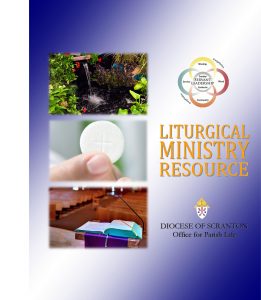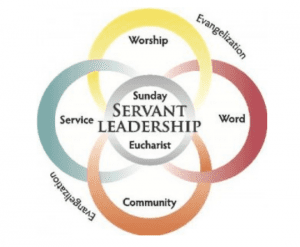Welcome!

Thank you for agreeing to serve as a coordinator of liturgical ministry in your parish!
Your skills as a parish leader are vital to the proper formation of candidates for liturgical ministry in the Church. This resource was prepared by the Office for Parish Life to assist you primarily in the formation of various liturgical ministers in the parish, as well as provide suggestions for ongoing formation, education, and spiritual renewal.
Included in the hard copy (binder) of this comprehensive resource is the Leader’s Guide consisting of the procedural suggestions for these formation sessions, the full text for the PowerPoint presentation, CDs with the PowerPoint Presentation and additional printed resources.
If you have any questions regarding this resource or if you would like to receive an additional copy for your parish, please contact the Office for Parish Life.
Program Overview
Learning Objectives
- To reflect on the spirituality of ministry as “servant leadership” in relation to the Bishop’s Pastoral Vision, Wounded and Loved, Regathering the Scattered
- To explain the role of the lay liturgical ministry especially historically and in relation to the ordained priesthood
- To inform the candidate of the requirements for the specific ministry
- To offer a comprehensive explanation of the liturgy and Eucharist
- To teach and demonstrate the proper procedure for carrying out the ministry
- To provide an overview of other but less common aspects of this ministry
Learning Methods
- Prayer—a call to prayer should be used to begin each session
- PowerPoint® slides to visualize examples of key learning points
- Brief discussions on particular questions or quotations to keep all participants actively involved in the formation
- Demonstration of skills needed and utilized for effective ministry
- Opportunities to ask questions
General Outline (will vary for each ministry)
- Prayer
- Understanding of Ministry
- Role of the Specific Ministry
- Requirements of the Ministry
- Liturgy and Eucharist
- Serving in the Specific Ministry
- Other Aspects of the Ministry
- Practicum (carried out by parish leader)
Requirements
- The Leader’s Guide
- The Liturgical Ministry PowerPoint® CD
- Registration forms for new liturgical ministers
- Name tags for participants
- A laptop computer with a disk drive and PowerPoint® software, an LCD Projector and screen (or blank wall) to project on. You will also need a microphone if the group is large.
- A hymnal or worship aid for participants with all the music or recited prayers used during the formation process
- Pencils or pens for any note taking by the participants
- Formation materials—printed handouts
- Location—normally would be held in a parish center or hall, but because of the spiritual nature of the process, this formation could be done in the church
- Hospitality—the host parish may want to provide simple refreshments such as water, coffee, juic, and cookies or doughnuts*
- Liturgical items used in the specific ministry
- Trained and experienced liturgical ministers to offer insights for the specific ministry
- Music is suggested for each prayer segment. You should arrange to have a musician from the host parish lead the singing
- Make all of these preparations well in advance so that you can relax and be hospitable to people as they arrive. Be sure to indicate the location of the restrooms at the beginning of the process.
*Please note if doing the formation sessions in church, please be respectful of the placement of the screen, projector, and refreshments. The host parish may have policy about bringing food into church.
Personal Preparation for Formation
- Familiarize yourself with the process—review the material numerous and practice offering the presentation on your own
- Allow sufficient time for the formation process—let the words sink in, allow time for discussion, reflection, and questions
- Be conscious of your group’s dynamic—everyone is on a different page: some may be life-long Catholics, others may have become members of the faith through RCIA, people coming from different parishes that may do things a little differently
- Use Church “lingo” cautiously—briefly explain each term you that the typical person on the street would not know
- Refer specific practices back to the parish—many parishes adapt the procedures or follow different guidelines
- Keep discussions manageable—you want people to share their insights briefly, and allow others to express their thoughts. Keep the discussion groups small, perhaps only having them discuss with the person next to them.
After Initial Formation
The pastors of those trained should be contacted and informed that their candidates have completed the initial formation and should receive specific training for carrying out their ministry in their parish. They should also be informed that these candidates should be commissioned for their ministry at an upcoming Sunday liturgy using provided ritual in the Book of Blessings.
Publicize Your Training Sessions
If you are offering a training session for a specific ministry, please publicize the training by contacting neighboring parishes or sending an announcement for their bulletin. This will maximize training opportunities in your area without doubling efforts or resources. You can also publicize your training session by contacting the Office for Parish Life.

Office for Parish Life
Diocese of Scranton
330 Wyoming Avenue
Scranton, Pennsylvania 18503
570-207-2213, fax 570-207-2204
www.www.dioceseofscranton.org
